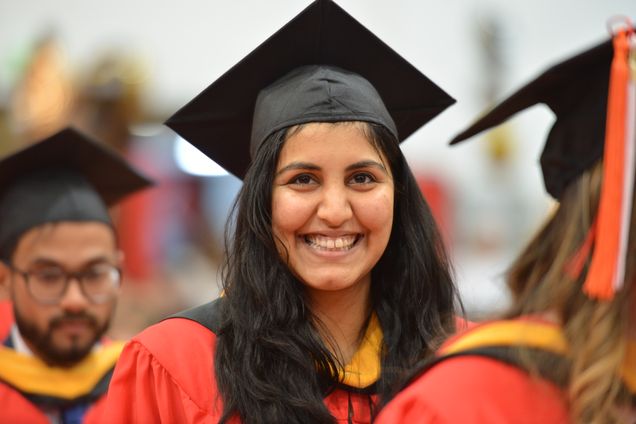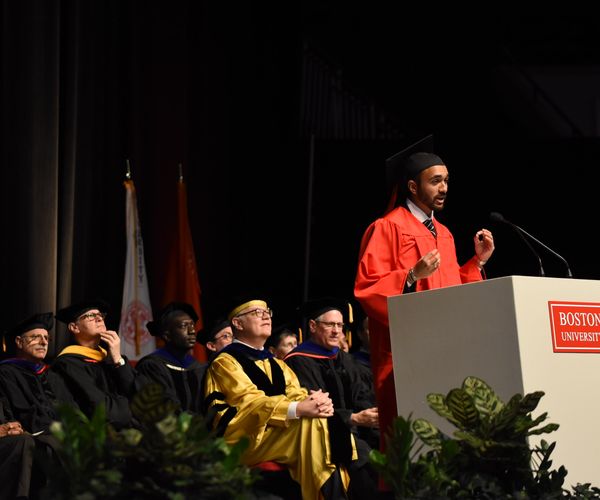At graduation ceremonies, speakers are confident in 2023 class of Societal Engineers
By Patrick L. Kennedy
Embrace serendipity. Collaborate and learn with diverse teams. And finally, strive to make a positive impact, Susan Margulies urged graduates as the College of Engineering celebrated its 2023 Commencement exercises. “The world needs you,” she said.
Margulies, the National Science Foundation’s assistant director of engineering, addressed nearly 400 bachelor’s degree recipients and their families and ENG faculty on May 20 in Agganis Arena. “Accept that there will be unexpected hurdles and opportunities that will change the pathways and the timing to reach your goals,” she advised the newly minted Societal Engineers.
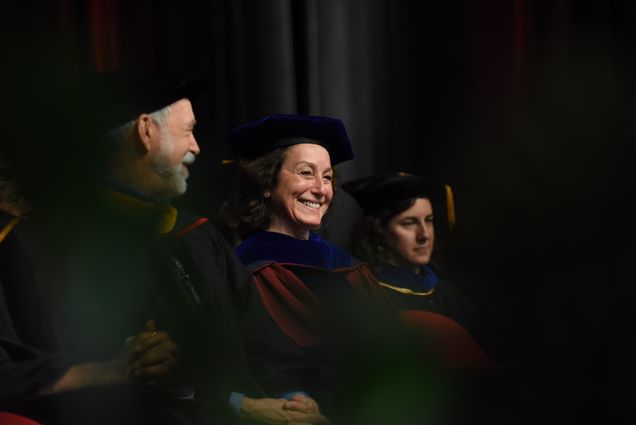
“Engineers collaborate to yield the most creative solutions,” said Margulies, who was the first faculty member tenured in both the Georgia Institute of Technology and Emory University, leading those institutions’ joint biomedical engineering department. “However, to fully understand the problem,” she added, “it is important to have teams with diverse life experiences that are learning and working together.”
Moreover, Margulies exhorted the graduates to maintain “a sense of urgency for action. The world’s pressing societal problems—food, water, energy, health—need our attention. As engineers, you have the capacity to envision transformational, equitable and resilient solutions.”
In his remarks, Dean Kenneth Lutchen expressed his confidence in these soon-to-be alumni. “No other engineering graduating class from any other school or college knows how to work really hard the way you guys do,” he said. “That’s one of the most critical attributes you need to succeed.”
Another attribute that will serve them well in solving global challenges, Lutchen said, is that “you understand the power of and the need for the scientific method.” When it comes to climate change, “You cannot leave the solution to just policymakers [and] corporate leaders,” most of whom lack STEM training, said Lutchen.
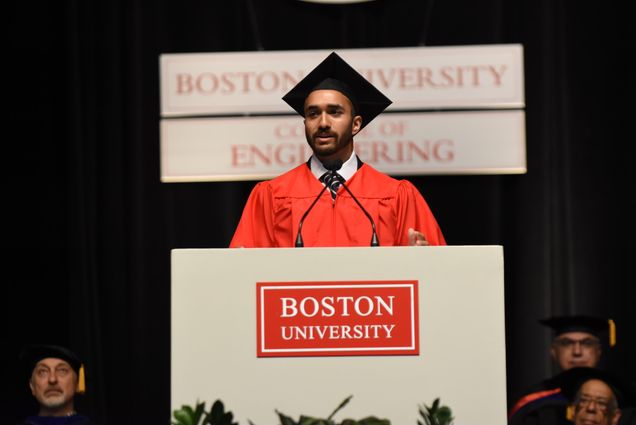
“We have learned the importance of being disciplined, working hard, being a leader, and questioning the status quo,” said student speaker Aman Patel, who earned his degree in mechanical engineering with a minor in biology and a concentration in energy technology and sustainability while also working as a dean’s host and EK 100 student advisor, among other roles.
Patel asked his classmates to consider their life’s purpose through the lens of ikigai, a Japanese concept that involves balancing four elements—“what you love, what you are good at, what the world needs, and what can sustain your livelihood,” Patel explained.
The third element in particular should resonate with BU Societal Engineers, Patel pointed out. Addressing the world’s needs “requires that we use the knowledge and skills that we have developed for the greater good of the local, and even global community,” he said. “We have been taught that the world will look to us to help create a more sustainable, energy-efficient and united planet. That it is our imperative duty to ensure that basic human rights such as availability to clean water, food and education can be offered all around the globe.”
Rashid Kolaghassi was named the Class of 2023 valedictorian. Kolaghassi earned a perfect 4.0 GPA as he completed his bachelor’s degree summa cum laude in mechanical engineering, with a concentration in machine learning and a minor in economics.
Assistant Professor Abdoulaye Ndao (ECE), Associate Professor Ray Nagem (ME), and Professor Ahmad (Mo) Khalil (BME) each earned their Department Award for Teaching Excellence. Khalil also earned the College Award for Teaching Excellence. Distinguished Professor of Engineering Ioannis Paschalidis (ECE, BME, SE) earned the Faculty Service Award.
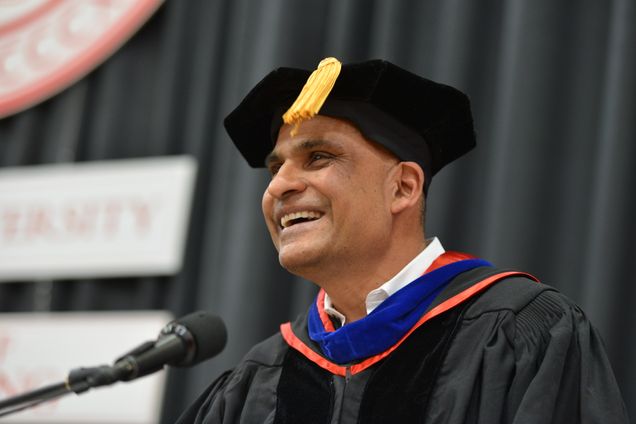
At the graduate convocation and doctoral hooding ceremony on May 18 in the Case Center, Abhijit (Abhi) Kulkarni (ENG’93, ’97) delivered an address emphasizing the importance of convergence in science and engineering. Citing a few well known successes of the convergent approach, such as the COVID-19 vaccine and plant-based Beyond burgers, Kulkarni said he can attest to its effectiveness in his own career, most recently as chief operating officer of Cellino, a pioneering biotech startup committed to expanding access to personalized, autologous cell therapies for patients of all backgrounds.
“I have the privilege of leading a team of talented engineers and scientists, working together on solutions to enable regenerative medicine, methods to coax the body’s own cells to become a living medicine to restore function to damaged cells, tissue and organs,” Kulknarni, who is also a member of the ENG Dean’s Leadership Advisory Board, said to an audience of more than 300 master’s and 80 doctoral graduates and their families and the faculty.
“Solving hard problems creates the greatest societal value,” Kulkarni said. “The solution to these big problems that span numerous domains—including healthcare, energy, and food production—now unmistakably resides at the very junction where diverse disciplines intersect.”
Graduates will find the stakes are higher as they move onto the larger stage of the real world, but, “I promise you, you are ready for it,” Kulkarni said. “I can’t wait to see how you change the world.”
